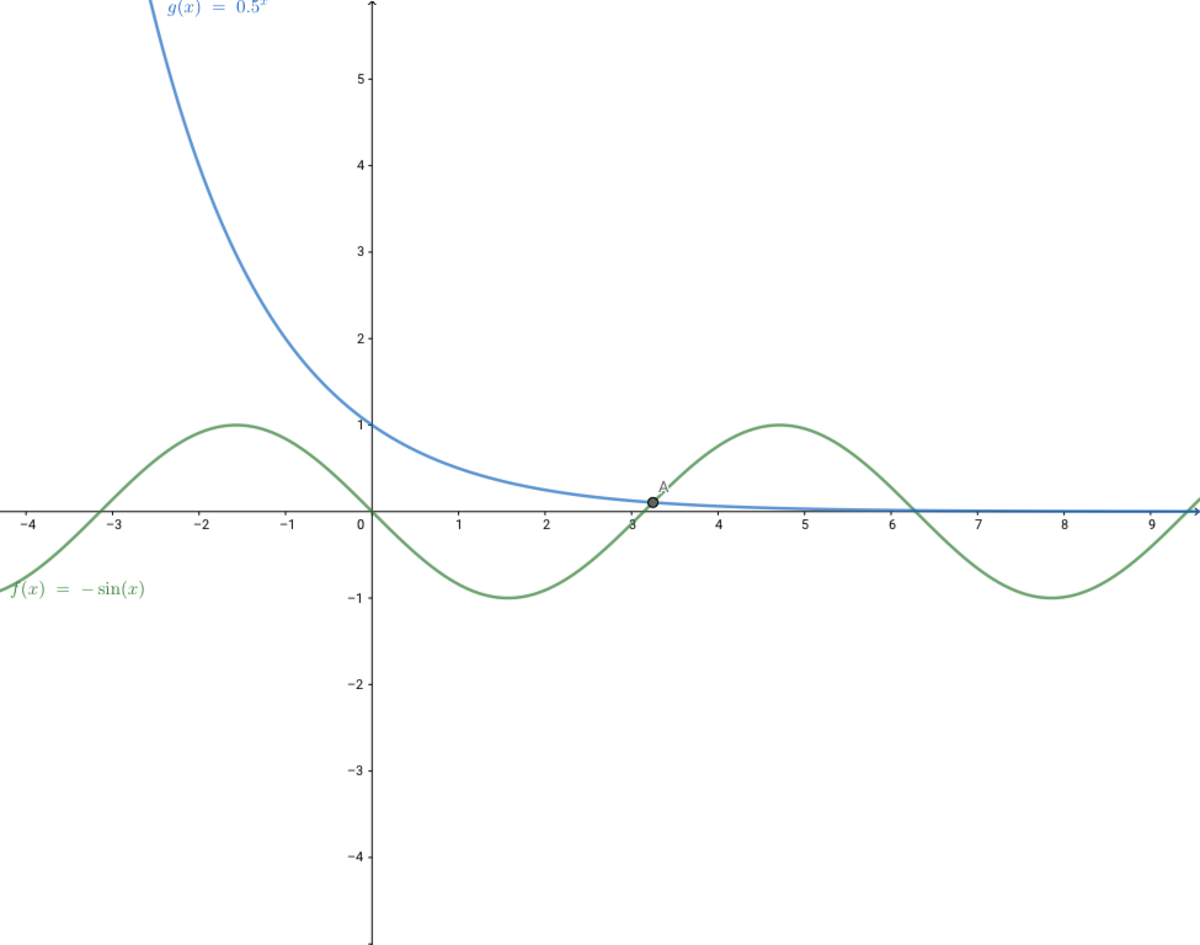The equation between − sin x and ( 2 1 ) x
− sin x = ( 2 1 ) x On the interval ( 0 , 1 0 0 π ) , find the number of x satisfying the equation above.
This section requires Javascript.
You are seeing this because something didn't load right. We suggest you, (a) try
refreshing the page, (b) enabling javascript if it is disabled on your browser and,
finally, (c)
loading the
non-javascript version of this page
. We're sorry about the hassle.
2 solutions
Consider the function f ( x ) = ( 1 / 2 ) x + sin x on [ ( 2 k + 1 ) π , ( 4 k + 3 ) π / 2 ] for k = 0 , 1 , ⋯ , 4 9 , and note that:
- f is continuous on [ ( 2 k + 1 ) π , ( 4 k + 3 ) π / 2 ] ,
- f ( ( 2 k + 1 ) π ) = ( 1 / 2 ) ( 2 k + 1 ) π + sin ( ( 2 k + 1 ) π ) = ( 1 / 2 ) ( 2 k + 1 ) π > 0 , and
- f ( 4 k + 3 ) π / 2 ) = ( 1 / 2 ) ( 4 k + 3 ) π / 2 + sin ( ( 4 k + 3 ) π / 2 ) = ( 1 / 2 ) ( 4 k + 3 ) π / 2 − 1 < 0
By the Intermediate Value Theorem, there is a number α k ∈ ( ( 2 k + 1 ) π , ( 4 k + 3 ) π / 2 ) such that f ( α k ) = 0 .
We now show that α k is the only root of f on the prescribed domain. Indeed, if γ k is another root, then:
- f is continuous on [ ( 2 k + 1 ) π , ( 4 k + 3 ) π / 2 ] ,
- f is differentiable on ( ( 2 k + 1 ) π , ( 4 k + 3 ) π / 2 ) , and
- f ( α k ) = f ( γ k ) = 0
By Rolle’s Theorem, there is a number δ ∈ ( ( 2 k + 1 ) π , ( 4 k + 3 ) π / 2 ) such that f ’ ( δ ) = 0 . However, f ’ ( δ ) = ( 1 / 2 ) δ ln ( 1 / 2 ) + cos δ < 0 yielding a contradiction.
Now consider f ( x ) = ( 1 / 2 ) x + sin x on [ ( 4 k + 3 ) π / 2 , ( 2 k + 2 ) π ] for k = 0 , 1 , ⋯ , 4 9 . A similar argument as before shows that there is a unique number β k ∈ ( ( 4 k + 3 ) π / 2 , ( 2 k + 2 ) π ) such that f ( β k ) = 0 .
Since f has exactly 1 0 0 roots on ( 0 , 1 0 0 π ) , − sin x = ( 1 / 2 ) x has 1 0 0 solutions on ( 0 , 1 0 0 π ) .
The function y = − sin x in ( 0 , 2 π ) , ( 2 3 π , 2 π ) is the minus function, in ( 2 π , 2 3 π ) is the increase function. − sin 0 = − sin 2 π = 0 , − sin 2 π = − 1 , − sin 2 3 π = 1 The function y = − sin x at x = 2 3 π . There is a maximum of 1 , y = − sin x at x = π . It has a minimum of − 1 . Because the function y = ( 2 1 ) x , Within the interval ( 0 , 1 0 0 π ) is the minus function. x > 0 , y ∈ ( 0 , 1 ) Therefore, the above equation has two solutions in interval ( 0 , 2 π ) . In x ∈ ( 0 , 1 0 0 π ) , The function y = − sin x , There are 5 0 cycles. So there are 1 0 0 solutions to this equation. The answer is 1 0 0 .